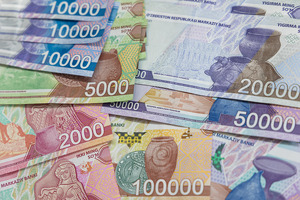Economy

Tourist center project near historical part of Bukhara is estimated at $470 million
Construction of a $470 million ethnographic tourist center near the historical part of Bukhara has started, despite the hokimiyat’s intention to make a final decision and start work only after receiving UNESCO’s resolution.

Production of gas, oil and other energy resources in Uzbekistan continues to fall
In late January, Uzbekistan’s gas production dropped 9.4% to 3.99 billion cubic meters from January 2023, though it remained higher than recent months. Oil, coal, gasoline, and diesel production also declined. The number of operational industrial enterprises decreased by 25,200.

Japan to loan Uzbekistan $246.2 million to continue economic reforms
Uzbekistan will receive from Japan a loan worth over $246.2 million to support economic reforms and socially vulnerable groups.

Uzbekistan plans to ban cash payment for some services and goods
Uzbekistan aims to diminish cash usage by implementing non-cash payments for public services offered by budget organizations, housing sold by developers, and various other sectors. The transition to cashless transactions is set to include wholesale trade in timber, tires and sugar.

Electricity supply restrictions are imposed in Uzbekistan
Insufficient electricity production in Uzbekistan and imports from Turkmenistan led to limitations of up to 400 MW during peak hours on Sunday, due to a power transmission line accident, says the Energy Ministry.

Monopoly on external Internet channel in Uzbekistan may finally end
By April 1, Uzbekistan plans to provide ISPs direct access to the international Internet channel. Uzbekistan has been planning to abolish the monopoly on external Internet channels since 2020 and has not executed yet. An independent telecommunications regulator may be established by September 1.

Individuals under economic sanctions may be banned from opening bank accounts in Uzbekistan
MPs passed a bill in the first reading that would ban those subjected to economic sanctions from opening bank accounts in Uzbekistan. Additionally, the Central Bank would be authorized to establish relevant risk management requirements.

Uzbekistan increases trade with China and Russia, decreases with neighbors in 2023
China replaced Russia as Uzbekistan’s primary trading partner in 2023. Trade with both countries increased, with growing imports to Uzbekistan and decreasing exports. At the same time, trade with neighboring Kazakhstan and Kyrgyzstan declined.

Uzbekistan and Belarus aim to increase trade turnover beyond $1 billion
Presidents of Uzbekistan and Belarus have agreed to increase trade turnover beyond $1 billion, effectively use trade corridors to South Asia and boost cooperation in agro-agricultural, pharmaceutical, food and light industries. Documents worth over $1 billion were signed at the regional forum.

International Digital Technology Center to be established in Uzbekistan
Special legal procedure will apply to foreign companies for five years at the relaunched International Digital Technology Center, aiming to boost Uzbekistan’s exports of IT services.

Minister of Ecology: Moratorium on construction of cement plants may be announced in Uzbekistan
Uzbekistan plans to ban the construction of cement plants, Minister of Ecology Aziz Abdukhakimov shared. Out of the 47 existing plants, 23 have suspended operations, he noted. A study of 25 cement producers revealed that 90% of them violate environmental requirements.

Josep Borrell: “Central Asia is the cornerstone between Europe and Asia”
Vice-President of the European Commission Josep Borrell stated at the Central Asia-EU Global Gateway Investors Forum that more needs to be invested in physical connections between these regions “to overcome past dependencies and find new alternatives for transport, energy and supply chains.”

Construction in Uzbekistan to be turned into “corruption-free sphere”
The president of Uzbekistan has announced measures to make the construction industry “corruption-free.” From July 1, all construction contracts will be digitized, contractors will receive financing through e-invoices only. A project office is being established under the Ministry of Construction.

EBRD approves new five-year strategy for Uzbekistan
EBRD has approved a new five-year strategy for Uzbekistan. Key priorities include supporting decarbonization, water efficiency and renewable energy, private sector development and business climate improvements.

Tashkent administration reveals plans to build “cable taxi”
Cable taxi line mirroring ground transport may be built in Tashkent, potentially along New Uzbekistan Street. Authorities promise to share project details with the public. Agreement with Beijing North Bartholet Cableway Technology Co., Ltd. was secured by city delegation led by the acting hokim.

Uzbekistan’s gas sales to China drop by half in 2023 compared to 2022
Uzbekistan’s natural gas supplies to China almost halved in 2023, reaching $563.5 million. In December, exports amounted to $54.5 million.

What Uzbekistan traded with foreign countries in 2023
Uzbekistan’s 2023 trade turnover increased by 23.8% to $62.6 billion, yielding a record $13.7 billion trade deficit. Record gold exports reached a third of total volume, while those of textile and manufactured goods declined. Imports surged for food, oil and gas.

Poverty line increases in Uzbekistan
Minimum monthly expenditure basket in Uzbekistan has been raised by 9.3%, from 568,000 to 621,000 soums (from $45.78 to $50.05). This indicator is used to determine the poverty line in the country and considers the inflation rate.

In 2024 Uzbekistan aims to ensure employment of five million people
Uzbekistan targets to create employment opportunities for 5 million people in 2024. Official unemployment rate currently stands at 1.3 million. Additional 2.4 million people are expected to step into the labor market during the year.

Uzbekistan remains global leader in gold sales for second consecutive month, despite decrease in reserves
Uzbekistan leads global gold sales for the second consecutive month, having sold 11 tons in November 2023. Despite a rise in international reserves in December, the country’s “financial cushion” dropped by $1.2 billion in 2023 to $34.56 billion, marking the first decline since 2018.
Sign up for additional features
